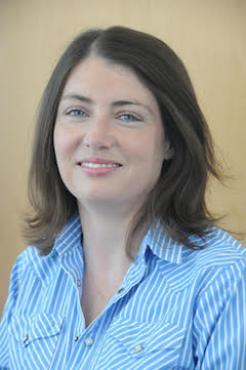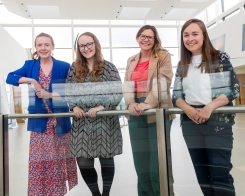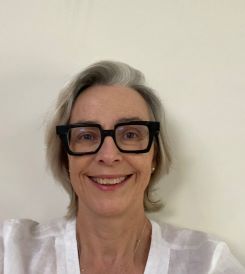ReCLAIM Round 1 Awardees
Scroll down to explore all awarded projects.
Project Title: Advanced Communication Skills for Research Teams
Principal Investigator: Dr Carol Aherne
Co PI: Dr Deborah Wallace, Dr Sergio Rey, Dr Stephen Thorpe

Project Summary:
The School of Medicine (SOM) is interested in facilitating an advanced communications workshop series to work towards building strong relationships within research teams. An anonymous survey was carried out of the SOM graduate students by the SOM Biomedical Research Degree Committee in December 2023, where the 132 graduate students within the school were invited to participate, with a 23.4% response rate. Of those that responded 28% stated they had a poor relationship with their supervisor. Furthermore, 28% stated they did not have a clear plan for their PhD studies and that they felt they could not approach their supervisor for help with their project. This highlights that there is lack of clear, consistent, communication within some research teams that is posing a significant problem for a large population of graduate students in the SOM. Clear and consistent two-way communication is central to maintaining a good research culture within teams. The goal of our proposal is to build confidence in communication within all research team members. They aim to achieve this by hosting facilitated workshops for graduate students, research assistants, postdoctoral fellows and faculty where communication skills for sideways, top-down and bottom-up conversations are taught and practiced. What is unique to our proposal is that we will offer advanced communications workshops tailored to the multiple elements of the research team where practical exercises of learned skills are the focus. This project aims to provide three separate offerings, one for students and research assistants, one for postdoctoral fellows and one for academic faculty.

Project Title: Enhancing research culture, problem-solving and knowledge translation: Robust evidence synthesis meets innovation through creativity and design thinking
Principal Investigator: Assoc Professor Kate Frazer
Co PI: Assoc Professor Barbara Coughlan, Dr Andrew Darley, Mr Liam Cleere, Professor Lizbeth Goodman, Professor Michelle Norris, Professor Patricia Fitzpatrick, Professor Thilo Kroll, Dr Nancy Bhardwaj, Mr Diarmuid Stokes
 (1).jpg)
Project Summary:
This 12-month project aims to co-develop a portfolio of creative and innovative activities to build research culture and excellence, building on current successes and leveraging the future potential for personal and academic development in four specific areas. Create a series of workshops establishing cross-university evidence review and synthesis introductory workshops for policy and practice as entry-level for all doctoral students. Develop and deliver design thinking workshops with interdisciplinary student groups to consider real-world health problems and create a university research challenge competition, ‘Building a Healthy and Fair World.’ Establish a Living Library Programme embedding research culture and wider UCD in the community. This pilot follows international examples and facilitates learning and engagement in real-world capture of building a research culture. Expand the global programme Universitas 21 Health Research Exchange (U21HREx) Community of Practice developed and led by the University of Maryland and the University of Birmingham. U21 ‘Communities of Practice’ provide a route for staff within the U21 network to build research cultures locally and globally and gain new professional perspectives. UCD is a partner in this community of practice, and we can leverage wider networking and collaboration. This project culminates in a one-day research symposium to share best practices and enable continued collaboration and networking.
They aim to propose two introductory workshops per semester and two sessions over the summer (6 workshops in total), focusing on (1) Getting Started with Evidence Reviews and Syntheses - Essentials; (2) Communicating Research for Practice and Policy Impact - Essentials. Develop and deliver design thinking workshops and use action-set learning to consider real-world health problems with interdisciplinary students. Student groups will work on a proposed challenge, ‘Building a Healthy and Fair World’. Each group will decide the specific focus. Will develop and pilot a Living Library Programme that embeds research culture and wider UCD in the community. This project culminates in a one-day research symposium to share best practices and enable continued collaboration and networking.

Project Title: Team of Teams for Research
Principal Investigator: Mr Allen Higgins
Co PI: Dr Paul Dylan-Ennis
.png)
Project Summary:
An innovative approach to enhancing the environment in which research takes place, the culture within which the research is performed, and to expand research communication skills by contributing to research community podcasts. This is a pilot initiative that aims to foster a positive and supportive research culture within research teams within the UCD College of Business and adjacent research teams in other schools or colleges of the university. They hope to identify impactful factors of the Team of Teams approach such that the practices and knowledge we development may be expanded and adopted more widely across the university. The project proposes to host a series of cross-research-community building activities centred on introducing the practice of research 'stand-up meetings' to research centres. They also plan to compliment the introduction of this practice-set with a series of invited speakers from research centres and industry to talk about collaborative, communicative, creative research cultures. The research culture activity will culminate in a 1 day symposium hosted at the end of the project.

Project Title: Carers Conference Support Fund Pilot Scheme
Principal Investigator: Ms Shonny Lehane
Co PI: Dr Aoife Brady, Assoc Professor Jennifer Keenahan, Assoc Professor Claire Harnett

Project Summary:
This project is to initiate a Carers Conference Support Fund to cover extra costs often borne by carers when attending conferences. This initiative will reduce barriers to professional development for carers, increase equity, position UCD as an EDI leader, and contribute to Athena Swan accreditation. This pilot scheme would be available to anyone employed in the School of Civil Engineering and the School of Earth Sciences; iCRAG -the SFI Research Centre in Applied Geosciences will be part of the administrative team. The pilot scheme will gather baseline data that could inform further expansion of the fund. Modelled after other Athena Swan-accredited programmes, the proposed new fund would be administered as an expense claim. Each claimant may claim twice per calendar year, to a maximum value of €150 based on evidence of paid carer fees or additional travel costs for the dependent. Conference attendance must be related to professional development. In addition, the fund would address significant concerns from academic staff – only 25.7% of Athena Swan survey respondents in the School of Earth Sciences, for example, agreed that the School provides adequate support for those with caring responsibilities. This pilot scheme also has the potential to develop into a university wide policy that would highlight UCD as an EDI leader; furthermore, it aligns with Strategic Objective 2 of the UCD 2021-2024 Strategy and Action Plan, making conference attendance more accessible for those with caring responsibilities and lower socio-economic backgrounds.

Project Title: Here Comes Everyone: Toward a Research Culture of Hospitality in the School of English, Drama and Film
Principal Investigator: Dr Éireann Lorsung
Co PI: Ms Kathryn Murray
Project summary:
Building on a successful workshop around research culture at NCAD delivered by Lorsung in January/February 2024, this project proposes to bring a model of reflective preparation and warm, engaged sharing of research to the School of English, Drama and Film. The motivation for developing this project is to increase the possibility of warm, productive, inventive, and creative collaboration across the School. Such a development requires careful, self-critical attention to our understandings of what research looks like, where and how it happens, whose work supports it, and what we mean when we say "collaboration" or "welcome". Three workshops will support members of the school (including BA dissertation students, MA students doing literary and scholarly research, PhD students, postdocs, staff, and faculty) to develop a warm, hospitable, and open culture that is supportive of research and collaboration. Regular, casual, and unprogrammed coffee hours over the 2024-25 school year will provide unstructured, shared space for conversation and chance encounters—as well as for putting our stated values of openness, hospitality, and conviviality into practice.
Finally, a research symposium will provide a place for researchers and collaborations of all kinds to be shared with a broader School and College community. A corollary benefit may be the transferable nature of our model to other Schools or to cross-disciplinary centres of research. Because of an established connection with researchers in visual arts at NCAD, future cross-institutional collaborations on research and development of a shared research culture may be possible.

Project Title: The Generator: Post-Doctoral Research in an Interdisciplinary World
Principal Investigator: Professor Imelda Maher
Co PI: Dr Roderick Jones, Professor Eilish McAuliffe

Project Summary:
This project aims to run a workshop series for post-doctoral researchers who have completed the first phase of their research career (completed post PhD research) and are about to move into the second phase (independent research) with a major new project. The aims are: to allow researchers to test ideas in an interdisciplinary environment. To receive feedback on their ideas and to explore if there are contributions that transcend their own discipline that could enhance their ideas. Develop a generation of scholars who understand the contributions and challenges of interdisciplinarity and how research and theory from other disciplines can enhance their research, while remaining grounded in their own expertise and discipline. A major challenges in UCD is creating opportunities for interdisciplinary discussion and idea generation across STEM and SSH. Limited opportunities exist for scholars to develop a common language, to agree publishing outlets, and identify common societal challenges that can be addressed through radical interdisciplinarity (i.e. STEM/SSH). By bringing together scholars through two research centres: IRIS and the DEI, ECRs will have the opportunity to explore their research plans and the opportunities for interdisciplinary research e.g. the PADMACs project on assisted decision-making in acute care examining legislation, governance, relationships between statutory and voluntary agencies etc. and the Trust project in the School of English. They can examine if there are common themes, methodologies, concepts, theories. Practically they can learn the constraints and challenges their colleagues face in other disciplines – how they are the same and different e.g. re funding, audiences, publishing, regionalism, temporality.

Project Title: Whose Story is it Anyway? Building an Ethical Culture of Collecting, Cataloguing and Archiving
Principal Investigator: Assoc Professor Samantha Martin
Co PI: Dr Brendan O'Neill

Project Summary:
UCD, understood in its widest sense, is one massive repository, both literally and figuratively. Our campus is akin to a storehouse holding thousands of educators and students whose research produces prodigious amounts of data. All of us, regardless of discipline or formal appointment, contribute to this creation and collection of data. Many disciplines such as History, Archaeology and Folklore routinely deploy archival visits, whereas schools like Information and Library Science and the Office of Research Ethics drill down into the principles and standards of collecting and archiving. Other schools, namely Computer Science, actually design and contribute to the very systems that collect and maintain Open Access and digital archives. While this vein of collecting and archiving has capillaries in every area of UCD, as a community we seldom come together to share approaches, pose questions or discuss the ethics surrounding archiving. As such, there are many missed opportunities for advancement in research culture literally on our doorstep. The overarching ambition of this project is to rectify this challenge through an inclusive, trans-disciplinary workshop that drives stronger practice in an equitable and representative way. The workshop they plan to run will be a so-called ‘third space’ for academics, staff and students to share experiences around the practice and theory of data collection and archiving. This will provide a mechanism for allowing interested parties to self-identify with the emergent priorities of the workshop. Simultaneously, it will develop strategies to harness the high potential of a community that is already operating within UCD but within siloes.

Project Title: Responsible use of GenAI for daily research activities
Principal Investigator Dr Shen Wang
Co PI: Dr Adrian Byrne

Project Summary:
Since ChatGPT powered by Large Language Models (LLMs) was released about one year ago, Generative Artificial Intelligence (GenAI) has attracted worldwide attention as it can generate textual, audio, and image information given short prompts and demonstrate competing human-level intelligence in many benchmarking tests. There are widespread interests and concerns across various disciplines at UCD in using GenAI for their daily research activities (e.g., reading, writing, and reviewing academic papers, book chapters, research proposals, analysing data, etc.) as it might encourage research misconduct and malpractice. The GenAI knowledge that non-Computer Science (CS) researchers have may be largely impacted by mass media which could be exaggerated. As a CS researcher, he know the benefits and limits of computing. After one year of experience in his research group, they found that similar to all other tools invented in human history, using GenAI responsibly can save time and energy meaning that researchers spend less time on repetitive work and more time doing innovative work for the greater benefit of all. Specifically, this project intends to achieve three objectives:
OBJ1: Demystifying GenAI: what it is good at and what is not
OBJ2: Drafting general guidance (domain-agnostic) to use GenAI for reducing repetitive research work while improving research quality
OBJ3: Adding responsible use of GenAI to the general guidance to avoid research misconduct or malpractice
To achieve these objectives, a series of workshops will be organised to engage all types of researchers at UCD.

Project Title: Interdisciplinary Early Career Seminar for Medieval Studies
Principal Investigator: Dr Megan Welton
Project Summary:
This project aims to run monthly interdisciplinary seminar series to enhance the research cultures of postgraduates and postdoctoral fellows in Medieval Studies. In the wake of the COVID-19 pandemic, research cultures for postgraduates and early career scholars have suffered acutely from the disconnect from their local academic communities, few occasions to develop their research through collaborative work, and the lack of opportunities to develop their national and international networks. The absence of opportunities at these formative stages has the potential to isolate young scholars, particularly in such interdisciplinary fields as Medieval Studies. This field requires deep knowledge of several academic discourses in order to construct innovative frameworks for new insights into fragmented records of distant pasts. In order to counteract these new challenges, this proposed initiative of an interdisciplinary seminar series will institute a collaborative model centred on UCD’s mediaeval postgraduate and postdoctoral community including those within the schools of History, Archaeology, and Irish, Celtic Studies and Folklore. The "Interdisciplinary Early Career Seminar for Medieval Studies" will meet monthly. It will pair advanced postgraduate and early career scholars with a mid-career or senior scholar from a different discipline at an external university, both of whom will be asked to reflect on a broad theme. This seminar will be chaired by an interdisciplinary steering committee composed of postgraduates and early career scholars. This steering committee will organize each aspect of these events, and ultimately craft a constructive and collaborative environment for the healthy and stimulating exchange of ideas and research.
